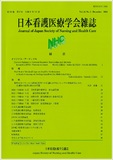Japanese
English
- 有料閲覧
- Abstract 文献概要
- 参考文献 Reference
Abstract
Aim: This study aimed to assess the level of nursing students’ knowledge and attitudes toward LGBTQ+ persons and to identify factors associated with their knowledge and attitudes toward them in Japan.
Methods: A cross-sectional online survey was conducted at a university in a metropolitan area of Japan in 2022. Potential participants were all students in the School of Nursing (N=231). The questionnaire consisted of demographic data and items focused on knowledge and attitude regarding LGBTQ+ persons. Statistically significant factors in bivariate analyses were forcibly entered into multiple linear regression and multiple logistic regression analyses.
Results: A total of 219 students responded to the questionnaire (response rate=95%). 3rd-4th school year students had significantly friendlier attitudes than 1st-2nd school years (p=0.013). Students closer to the LGBTQ+ community had higher knowledge (p=0.002). In addition, students who reported themselves as LGBTQ+ had significantly higher knowledge than heterosexual students (p=0.016). Male (p=0.003) students had lower knowledge than female. Regarding knowledge items, the lowest percentage of correct answers (10.5%) was about gender-affirming surgery. Regarding attitudes items, the lowest percentage of students (13.2%) felt that taking a gender history from patients was important.
Conclusions: Nursing students' LGBTQ+ knowledge and attitudes were associated with the school year, gender, sexual orientation, and relationship with LGBTQ+ persons. Including transgender content and engaging with LGBTQ+ persons will be important in future lectures for nursing students.
Abstract
Aim: This study aimed to assess the level of nursing students' knowledge and attitudes toward LGBTQ+ persons and to identify factors associated with their knowledge and attitudes toward them in Japan.
Methods: A cross-sectional online survey was conducted at a university in a metropolitan area of Japan in 2022. Potential participants were all students in the School of Nursing (N=231). The questionnaire consisted of demographic data and items focused on knowledge and attitude regarding LGBTQ+ persons. Statistically significant factors in bivariate analyses were forcibly entered into multiple linear regression and multiple logistic regression analyses.
Results: A total of 219 students responded to the questionnaire (response rate=95%). 3rd-4th school year students had significantly friendlier attitudes than 1st-2nd school years (p=0.013). Students closer to the LGBTQ+ community had higher knowledge (p=0.002). In addition, students who reported themselves as LGBTQ+ had significantly higher knowledge than heterosexual students (p=0.016). Male (p=0.003) students had lower knowledge than female. Regarding knowledge items, the lowest percentage of correct answers (10.5%) was about gender-affirming surgery. Regarding attitudes items, the lowest percentage of students (13.2%) felt that taking a gender history from patients was important.
Conclusions: Nursing students' LGBTQ+ knowledge and attitudes were associated with the school year, gender, sexual orientation, and relationship with LGBTQ+ persons. Including transgender content and engaging with LGBTQ+ persons will be important in future lectures for nursing students.
Copyright © 2024, Japan Society of Nursing and Health Care All rights reserved.


